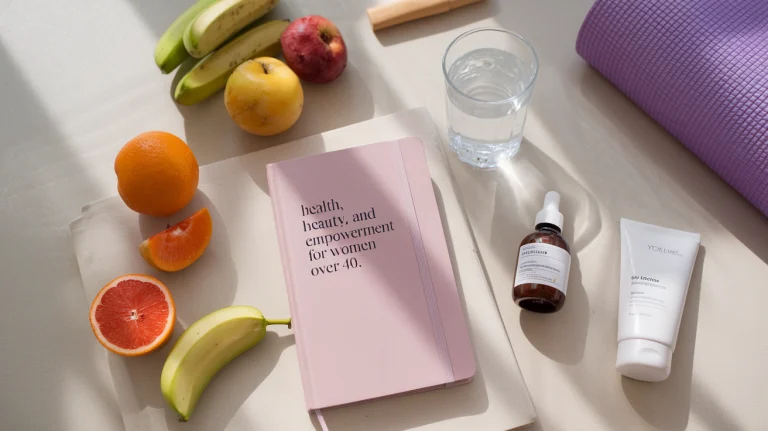Essential Health Screenings for Women Over 40
This page may contains affiliate links. We may earn a commission for purchases made at no additional cost to you. The content on this website was created with the help of AI.
We share triumphs and trials with friends, and our health is a big part of those stories. As women over 40, we’re writing new chapters where self-care is key. It’s about listening to our bodies and celebrating life.
Every time we see a healthcare provider, it’s more than just a check-up. It’s a chance to show we care about our health. These health screenings for women over 40 help us take control of our health stories.

These screenings are like our health detectives, finding stories of strength and health. They help us understand our bodies better and live longer, fuller lives.
We’re all in this together, using knowledge to stay healthy. We support each other, celebrating every health victory. From blood pressure to mammograms, we’re on a journey to health and happiness beyond 40.
The Importance of Routine Screenings for Women’s Health
Many of us know about the importance of screenings for women. But why do they become so crucial after we turn 40? These regular health checks do more than just prevent diseases. They help set a health baseline, understand personal risks, and start early interventions.

Understanding Why Regular Checkups are Vital
Regular health checks for women bring many benefits. They catch health problems early, when they’re easier to treat. For example, mammograms, starting at 40 and done every 1 to 2 years, are key for finding breast cancer early. This greatly increases the chance of successful treatment.
Also, cholesterol checks, starting at 45, are crucial for preventing heart disease.
Navigating Through Preventative Care for Women
Good preventative care for women looks at long-term health and includes screenings based on age and risk. Here’s a table showing the recommended screenings for women over 40:
| Screening Type | Age to Start | Frequency |
|---|---|---|
| Pap and HPV Test | 30 | Every 3-5 years |
| Mammography | 40 | Every 1-2 years |
| Cholesterol Screening | 45 | Periodic |
| Colorectal Cancer | 45 | 5-10 years or as recommended |
| Eye Exams | 40 | Every 2-4 years |
To get the most out of preventative care, women should talk to their healthcare providers often. This helps tailor screening schedules to their health and family history. By doing this, women can take control of their health and live a better life.
The Role of Blood Pressure Monitoring in Women’s Health Assessments
Monitoring women’s health is key, especially as we get older. Blood pressure checks are a big part of this. They help us understand our heart health and prevent problems linked to age.

Why are these checks so important? Almost half of American adults face risks from heart attacks and strokes, often due to high blood pressure. These risks are silent, making regular health checks crucial.
Keeping an eye on our heart health is vital. The American Heart Association recommends blood pressure screenings every two years starting at 20. As we get older, our blood pressure changes, making more frequent checks necessary.
How Often Should Blood Pressure Be Checked
Women over 40 should have their blood pressure checked every year. If you have diabetes, obesity, or a family history of high blood pressure, you might need more frequent checks. These screenings help catch and manage health problems early.
Understanding Blood Pressure Numbers and Their Significance
It’s important to know what blood pressure numbers mean. Here’s a quick guide with a table to help you understand:
| Blood Pressure Category | Systolic mm Hg (Upper Number) | Diastolic mm Hg (Lower Number) |
|---|---|---|
| Normal | Below 120 | Below 80 |
| Elevated | 120-129 | Less than 80 |
| Hypertension Stage 1 | 130-139 | 80-89 |
| Hypertension Stage 2 | 140 or higher | 90 or higher |
| Hypertensive Crisis (consult your doctor immediately) | Higher than 180 | Higher than 120 |
Knowing and tracking these numbers is vital. It’s not just about being proactive; it’s about managing age-related blood pressure changes. This ensures we live longer and healthier lives.
Early Detection in Women’s Health: Breast Cancer Screening Guidelines
Early detection is key to keeping women healthy, especially with breast cancer screening. Mammograms are a main tool for finding cancer early. They help treat it better. Let’s look at the guidelines and other tests for complete health checks.
Mammography: Starting Age and Frequency
Mammograms are a top choice for breast cancer screening. Women 40 to 44 can start yearly mammograms, with their doctor’s advice. Those 45 to 54 should get one every year for early detection.
Women 55 and older might choose to get mammograms every two years. But, they can also choose to get them yearly, based on their health and wishes.
Assessing the Need for Additional Tests Like MRI
For those at high risk, MRI tests might be needed too. Women at high risk, due to genes or family history, should get both mammograms and MRI every year from age 30. But, women at lower risk should not get MRI screenings.
Using risk assessment tools is important. They help figure out who needs more screenings. This way, screenings can be more tailored to each woman’s health.
Mammograms have their benefits but can also lead to false positives. This can cause more tests, worry, and harm. So, it’s important to make informed choices with your doctor. This ensures health checks are not just for peace of mind but also for real preventive care.
At [Company Name], we’re here to support you in your health journey. We provide guidance and info to help you make informed choices about breast cancer screening and more. Our goal is to help you live a healthier, informed, and proactive life, with confidence and support every step of the way.
Cervical Cancer Screening Recommendations for Women Over 40
Women over 40 need to focus on their health, and cervical cancer screening is key. Medical science has made Pap smear and HPV test crucial for finding and stopping cervical cancer early.
Women should talk to their doctor about when to get screened. Starting at 30 and going up to 65, a Pap smear every three years or an HPV test every five is often suggested. If you’ve had precancer before, keep getting screened for twenty years after treatment or until you’re 65, whichever comes first.
| Age Group | Recommended Screening | Frequency |
|---|---|---|
| 21-29 years | Pap Smear | Every 3 years |
| 30-65 years | HPV Test, Pap Smear, or Both (Cotest) | Every 3 to 5 years |
| Over 65 years | Discuss with healthcare provider | Varies |
If you’ve had a total hysterectomy and never had precancer, you don’t need to get screened anymore. It’s important to talk to your doctor to make a screening plan that fits your health and risks.
- High-risk HPV infection is linked to almost all cervical cancer cases.
- Other risks include HIV, weak immune system, DES exposure in the womb, and past precancer or cancer treatments.
Health guidelines change as new research comes out. These updates aim to make sure every woman gets the best screening at the right time.
We urge all women to be informed and proactive about their cervical cancer screening plans. It’s not just about saving lives; it’s also about feeling secure in your health and well-being.
Cholesterol Screening and Heart Health for Women Over 40
It’s important for women to understand cholesterol screening and heart health, especially in their 40s. This age is key for preventing heart disease and living well. Women’s health checks are crucial during this time.
When to Start and How Often to Screen for Cholesterol
Cholesterol tests should start at 20, but women over 40 need more attention. Hormonal changes can affect cholesterol levels. The American Heart Association recommends testing every four to six years for adults over 20.
But, women over 40 or at high risk might need tests more often. This helps track changes and manage risks.
Lifestyle Factors and Their Impact on Cholesterol Levels
Our daily habits greatly affect cholesterol levels and heart health. Eating right, exercising, and keeping a healthy weight are key. It’s important to watch your body mass index (BMI) and adjust your lifestyle to support your heart.
- Diet: Eating fruits, vegetables, whole grains, and lean proteins helps manage cholesterol.
- Exercise: Regular activity boosts ‘good’ cholesterol and lowers ‘bad’ cholesterol.
- Weight Management: Being overweight increases heart disease risk, so staying healthy is crucial.
Cholesterol tests require fasting for 9 to 12 hours before. This ensures accurate readings of LDL, HDL cholesterol, and triglycerides. Blood pressure and glucose levels are also checked, giving a full picture of health.
Regular cholesterol screening is vital for women’s health. It helps them make smart choices about their health and lifestyle. It’s about living a long, healthy life, not just adding years.
health screenings for women over 40: The Essential List
When women turn 40, taking care of their health is crucial. As they get older, the risk of health problems grows. That’s why wellness exams for women are key. Here’s a list of comprehensive health screenings every woman over 40 should have. These tests help find problems early and keep you healthy for years to come.
- Blood Pressure Screenings: Essential yearly to monitor heart health.
- Breast Cancer Screening: Mammograms are recommended annually or biennially depending on your health history.
- Cervical Cancer Screening: Pap tests and HPV tests every 3 to 5 years.
- Cholesterol Screening: Every 2 to 5 years to keep an eye on heart health.
- Colorectal Cancer Screening: Various tests like colonoscopies start at age 45 and are repeated every 10 years.
- Osteoporosis Screening: Bone density tests every 5 years beginning at age 50.
- Diabetes Screening: Especially if you’re overweight or have a family history, starting at age 35.
Each screening is a vital part of the women’s health check-up list. It helps catch health problems early.
| Age Group | Screening | Frequency |
|---|---|---|
| 40s | Full-body skin exams, mammogram, cholesterol | Annually for skin and mammogram, cholesterol as per doctor’s advice |
| 50s | Bone density, thyroid panel, cardiac tests | Every 5 years for bone density and thyroid, cardiac scoring every 10 years |
| 60+ | Dementia, Alzheimer’s screenings | Annually |
Remember, your health needs are unique. Always talk to your doctor to make sure you’re getting the right comprehensive health screenings for you.
By getting these wellness exams for women, you improve your life and stay healthy. Start by making appointments and make these tests a regular part of your health care.
Understanding the Need for Diabetes Screening in Monitoring Women’s Health
Let’s explore why checking for prediabetes and type 2 diabetes is key for women’s health, especially as they get older.
Women in their mid-thirties and beyond face metabolic changes that raise their risk of type 2 diabetes. Early detection and management through screening can improve health and quality of life later on.
Factors That Increase the Risk for Diabetes in Women
Several factors increase diabetes risk in women over 40. Obesity, high blood pressure, and heart disease are big ones. Family history also matters, showing a genetic risk. Lifestyle choices like diet and exercise can help or hurt this risk.
Guidelines for Screening and Prevention
Screening for diabetes starts at 35 for those with risk factors. Women over 40 should get checked every three years. Early detection is crucial for timely treatment.
Let’s look at how diabetes screening fits into overall health checks based on research:
| Screening Type | Starting Age | Frequency |
|---|---|---|
| Type 2 Diabetes | 35 years | Every 3 years |
| Blood Pressure | Adult | Annually |
| Mammograms (U.S. Preventive Services Task Force) | 40 years | Every other year |
Early detection through screening can lead to interventions that greatly impact a woman’s health. For diseases like diabetes, early changes in diet and lifestyle can prevent or delay it. By promoting screenings, we support a proactive approach to women’s health, focusing on prevention and early action.
We encourage all women to talk to their doctors about a screening plan that fits their health needs. It’s about living longer and better, not just longer.
Colorectal Cancer Screening: Protecting Women’s Health as They Age
As we get older, taking care of our health is more important. For women over 40, colorectal cancer screening is key. Knowing about the different tests and when to get them can help a lot.
Different Screening Tests and When to Have Them
Women should start getting screened for colorectal cancer at 45 if they’re at average risk. There are several tests, like the fecal occult blood test, which you should get every year. Another good option is CT colonography, which you should get every five years.
Each test has its own schedule and way of working:
- Fecal occult blood test: Annually
- CT colonography: Every 5 years
- Colonoscopy: Every 10 years
- Flexible sigmoidoscopy: Every 5 years, unless colonoscopy is done every 10 years.
Risk Factors for Colorectal Cancer in Women Over 40
Things like age, family history, and conditions like ulcerative colitis can raise your risk. If you have any of these, you might need to get screened more often. Talking to your doctor about these risks helps make sure you get the right screening.
Here’s a table showing how often you should get screened based on your risk:
| Risk Factor | Screening Frequency |
|---|---|
| Age 45+ (Average risk) | Every 10 years (Colonoscopy) |
| Family history of colorectal cancer | Every 5 years (Colonoscopy) |
| Ulcerative colitis | Every 1-2 years (Colonoscopy) |
Getting regular colorectal cancer screening is a simple way to protect your health. If you’re over 40 or have any risk factors, talk to your doctor about screening today.
Immunizations and Preventative Care for Women Entering Their 40s
Women turning 40 need to focus on staying up-to-date with their vaccines. This is key for preventive care. Vaccines like the flu shot, COVID-19 vaccine, and tetanus-diphtheria boosters are crucial. They protect against serious illnesses that can affect your life quality.
The shingles vaccine is recommended at 50, and pneumococcal vaccines at 65. But, health experts might suggest more based on your health and risks. This shows that vaccines are tailored for different life stages. They are part of a wide range of preventive care services.
Preventive care goes beyond vaccines. It includes regular health check-ups and screenings. For example, many women over 40 face issues like a leaky bladder. And, up to 50% of women over 50 might get osteoporosis fractures.
It’s important to know about screenings like colonoscopies at 45 and regular mammograms. Also, watch out for changes in bone density as you age. We want to empower women with knowledge. This way, they can take a holistic approach to preventive care, staying healthy and aging well.






